Market Signals Summary:
The Hi-Lo Index of the S&P 500, the iM-Google Trend Timer and the CAPE-Cycle-ID are out of the stock markets. However, the MAC-US as well as the S&P 500 Coppock Indicator are invested the Stock Market. Recession indicators that are signalling a recession are: BCIp is signalling a recession since end December 2022; the Forward Rate Ratio between the 2 and 10 year rates inverted beginning August 2022; and the growth of the Conference Board’s Leading Economic Indicator is signalling a recession since November 2022. The Gold Coppock is invested in gold, so is the iM-Gold Timer. The Silver Coppock model is invested in silver.
Stock-markets:
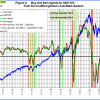 The MAC-US model invested the US stock markets in first week of February 2023.
The MAC-US model invested the US stock markets in first week of February 2023.
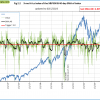 The 3-mo Hi-Lo Index Index of the S&P500 is at +2.69% (last week +1.31%), and exited the stock markets March 7, 2023.
The 3-mo Hi-Lo Index Index of the S&P500 is at +2.69% (last week +1.31%), and exited the stock markets March 7, 2023.
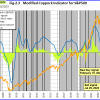 The Coppock indicator for the S&P500 entered the the US stock markets in the first week February 2023. This indicator is described here.
The Coppock indicator for the S&P500 entered the the US stock markets in the first week February 2023. This indicator is described here.
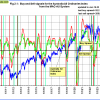 The MAC-AU model generated a buy signal end August 2022, and is invested the Australian stock market.
The MAC-AU model generated a buy signal end August 2022, and is invested the Australian stock market.
This model and its application is described in MAC-Australia: A Moving Average Crossover System for Superannuation Asset Allocations.
Recession:
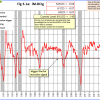 BCIg signaled a recession March 16, 2023, but by June 9, 2023 has recovered and is above the trigger level that signals recession.
BCIg signaled a recession March 16, 2023, but by June 9, 2023 has recovered and is above the trigger level that signals recession.
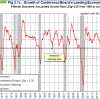 The growth of the Conference Board’s Leading Economic Indicator after the August 18, 2022 update signals a recession. The November 18, 2022 update of the Leading Economic Indicator is signaling that the US economy is/will soon be in a recession.
The growth of the Conference Board’s Leading Economic Indicator after the August 18, 2022 update signals a recession. The November 18, 2022 update of the Leading Economic Indicator is signaling that the US economy is/will soon be in a recession.
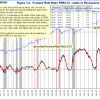 The Forward Rate Ratio between the 2-year and 10-year U.S. Treasury yields (FRR2-10) inverted beginning August 2022 and is signalling a recession — the average lead time of this signal is 14 months.
The Forward Rate Ratio between the 2-year and 10-year U.S. Treasury yields (FRR2-10) inverted beginning August 2022 and is signalling a recession — the average lead time of this signal is 14 months.
A description of this indicator can be found here.
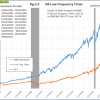 The iM-Low Frequency Timer switched to bonds on 9/26/2023.
The iM-Low Frequency Timer switched to bonds on 9/26/2023.
A description of this indicator can be found here.
